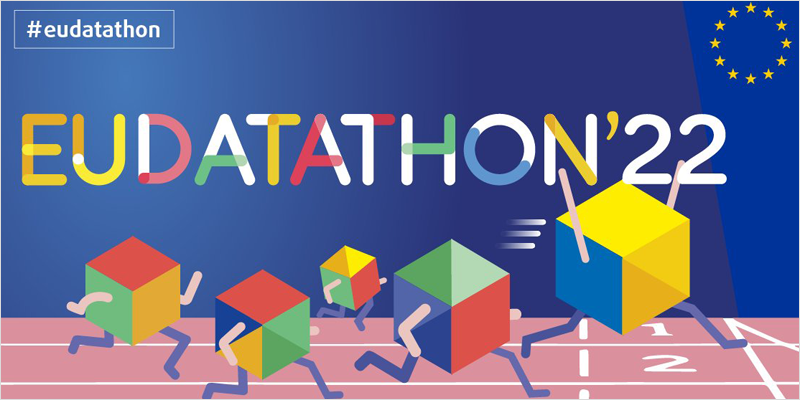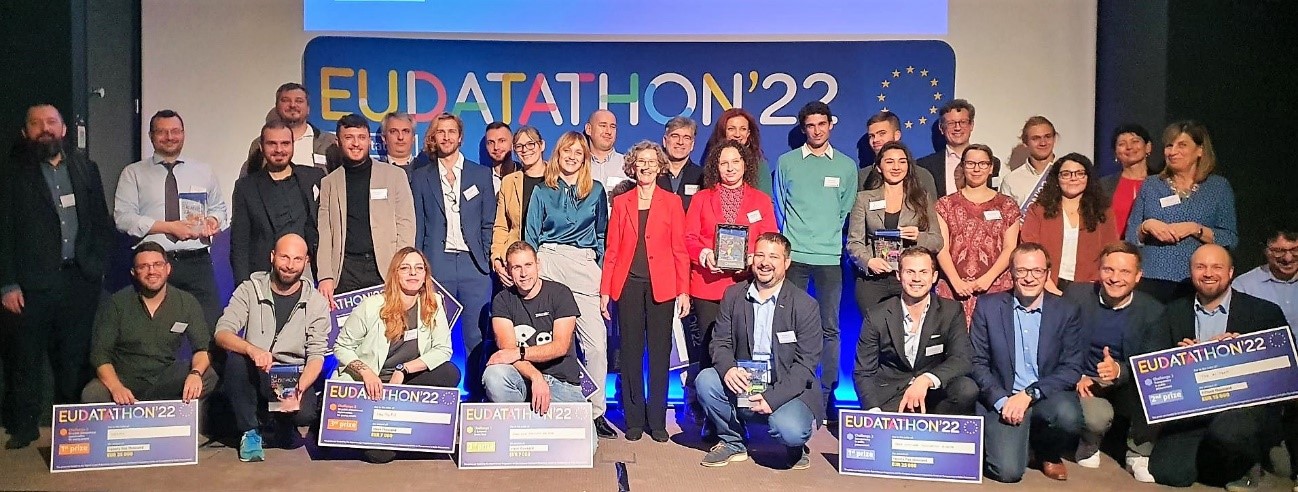
On 20 October, the EU's open data competition came to an end after several months of competition. The final of this sixth edition of the EU Datathon was held in Brussels in the framework of the European Year of Youth and was streamed worldwide.
It is a competition that gives open data enthusiasts and application developers from around the world the opportunity to demonstrate the potential of open data, while their innovative ideas gain international visibility and compete for a portion of the total prize money of €200,000.
The finalist teams were pre-selected from a total of 156 initial submissions. They came from 38 different countries, the largest participation in the history of the competition, to compete in four different categories related to the challenges facing Europe today.
Before the final, the selected participants had the opportunity to present in video format each of the proposals they have been developing based on the open data from the European catalogues.
Here is a breakdown of the winning teams in each challenge, the content of the proposal and the amount of the prize.
Winners of the “European Green Deal” Challenge
The European Green Deal is the blueprint for a modern, sustainable and competitive European economy. Participants who took up the challenge had to develop applications or services aimed at creating a green Europe, capable of driving resource efficiency.
1st prize: CROZ RenEUwable (Croatia)
The application developed by this Croatian team, "renEUwable", combines the analysis of environmental, social and economic data to provide specific and personal recommendations on sustainable energy use.
- Prize: €25,000
2nd prize: MyBioEUBuddy (France, Montenegro)
This project was created to help farm workers and local governments find regions that grow organic produce and can serve as an example to build a more sustainable agricultural network.
- Prize: €15,000
3rd prize: Green Land Dashboard for Cities (Italy)
The bronze in this category went to an Italian project that aims to analyse and visualise the evolution of green spaces in order to help cities, regional governments and non-governmental organisations to make them more liveable and sustainable.
- Prize: €7,000
"Winners of the “Transparency in Public Procurement” Challenge
Transparency in public procurement helps to track how money is spent, combat fraud and analyse economic and market trends. Participants who chose this challenge had to explore the information available to develop an application to improve transparency.
1st prize: Free Software Foundation Europe e.V (Germany)
This team of developers aims to make the links between the private sector, public administrations, users and tenders accessible.
- Prize: €25,000
2nd prize: The AI-Team (Germany)
This is a project that proposes to visualise data from TED, the European public procurement journal, in a graphical database and combine them with ownership information and a list of sanctioned entities. This will allow public officials and competitors to trace the amounts and values of contracts awarded back to the owners of the companies.
- Prize: €15,000
3rd prize: EMMA (France)
This fraud prevention and early detection tool allows public institutions, journalists and civil society to automatically monitor how the relationship between companies and administration is established at the beginning of a public procurement process.
- Prize: €7,000
Winners of the “Public Procurement Opportunities for Young People” Challenge
Public procurement is often perceived as a complex field, where only specialists feel comfortable finding the information they need. Thus, the developers who participated in this challenge had to design, for example, apps aimed at helping young people find the information they need to apply for public procurement positions.
1st prize: Hermix (Belgium, Romania)
It is a tool that develops a strategic marketing methodology aimed at the B2G (business to government) sector so that it is possible to automate the creation and monitoring of strategies for this sector.
- Prize: €25,000
2nd prize: YouthPOP (France)
YouthPOP is a tool designed to democratise employment and public procurement opportunities to bring them closer to young workers and entrepreneurs. It does this by combining historical data with machine learning technology.
- Prize: €15,000
3rd prize: HasPopEU (Romania)
This proposal takes advantage of open EU public procurement data and machine learning techniques to improve the communication of the skills required to access this type of job vacancies. The application focuses on young people, immigrants and SMEs.
- Prize: €7,000
Winners of the “A Europe Fit for the Digital Age” Challenge
The EU aims for a digital transformation that works for people and businesses. Therefore, participants in this challenge developed applications and services aimed at improving data skills, connectivity or data dissemination, always based on the European Data Strategy.
1st prize:: Lobium/Gavagai (Netherlands, Sweden, United Kingdom)
This application, developed using natural language processing techniques, was created with the aim of facilitating the work of investigative journalists, promoting transparency and rapid access to certain information.
- Prize: €25,000
2nd prize: 100 Europeans (France)
It is an interactive app that uses open data to raise awareness of the great challenges of our time. In this way, and aware of how difficult it is to communicate the impact that these challenges have on society, '100 Europeans' changes the way of conveying the message and personalises the effects of climate change, pollution or overweight in a total of one hundred people. The aim of this project is to make society more aware of these challenges by telling them through the stories of people close to them.
- Prize: €15,000
3rd prize: UNIOR NLP (Italy)
Leveraging European natural language processing techniques and data collection, the Computational Linguistics and Automatic Natural Language Processing research group at the University of Naples L'Orientale has developed a personal assistant called Maggie that guides users to explore cultural content across Europe, answering their questions and offering personalised suggestions.
- Prize: €7,000
Finally, the Audience Award of this 2022 edition also went to CROZ RenEUwable, the same team that won the first prize in the challenge dedicated to fostering commitment to the European Green Pact.

As in previous editions, the EU Datathon is a competition organised by the Publications Office of the European Union in collaboration with the European Data Strategy. Thus, the recently closed 2022 edition has managed to activate the support of some twenty partners representing open data stakeholders inside and outside the European institutions.